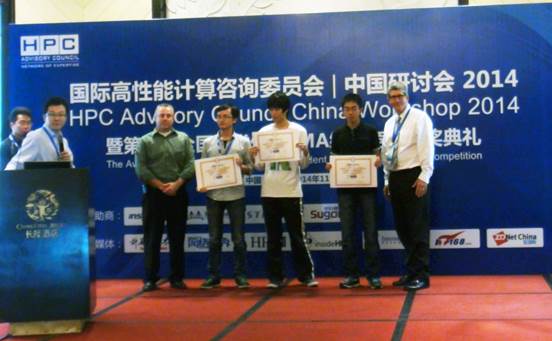 Today the HPC Advisory Council announced its Fourth Annual RDMA Programming Competition in China. Designed to support undergraduate curriculum and talent development, this unique hands-on competition furthers students study, experience and mastery.
Today the HPC Advisory Council announced its Fourth Annual RDMA Programming Competition in China. Designed to support undergraduate curriculum and talent development, this unique hands-on competition furthers students study, experience and mastery.
Deep learning, big data and data analysis all rely on RDMA technology to improve performance and efficiency, enabling extensive searches in mass data,” said Gilad Shainer, HPC Advisory Council chairman. “This year, we have expanded the scope of the RDMA competition, involving more international universities whose participation brings a new source of vitality and innovation. I believe with the students’ efforts, RDMA’s application in the deep learning sector and the development of next-generation application technologies will be facilitated.”
Launched in 2013, over 20 colleges and universities across China took part in the inaugural competition. Last year’s competition attracted more than 50 colleges and universities drawing attention from world-renowned experts from HPC, cloud computing and Big Data sectors as well as extensive media coverage.
The 2016 competition theme is centered on the world’s supercomputing development, highlighting the theoretical framework, practical model and future development of deep learning, and emphasizes the practical use of competition subjects. Nowadays, “deep learning” has demonstrated powerful development momentum, and how to utilize high performance computing to facilitate deep learning has become an industry-wide focus in recent years.
As an advanced network data transmission mode, RDMA (remote direct memory access) technology has been extensively applied to HPC, deep learning, cloud computing, big data and high-frequency trading sectors. Compared with traditional networks, RDMA can significantly improve efficiency by allowing computers in a network to exchange data directly from memory without involving the processor, cache or the OS of any computer.
Compared with traditional TCP/IP networks, RDMA features high bandwidth, low latency and low CPU occupancy rate, and is favored by deep learning tasks,” said Dennis Weng, R&D vice president, JD.Com. “RDMA can also significantly improve efficiency in original applications. By virtue of deep learning platforms supporting RDMA technology, an e-commerce platform can, based on user behavior data, rapidly realize ‘user portrait’ analysis, achieve intelligent and efficient mass data processing, and provide users with pertinent and individualized commodities and services.”
This year’s competition will feature an expanded lecture series at universities in major provinces and cities throughout China. Senior RDMA engineers and R&D professionals provide training for students eager to study RDMA and deep learning knowledge. Current planning for the lecture tour includes: Beijing, Shanghai, Guangzhou, Chongqing, Changchun, Xi’an, Harbin, Sichuan, Wuhan, Nanjing and Hefei.
This year’s competition has been honored with the support of multiple institutions. The competition review committee, led by HPCAC chair Gilad Shainer, includes senior experts and leading professionals deep learning including: Dennis Weng, chief technical advisor, JD.Com; Bryan Catanzaro, senior research, Baidu Inc.; Dr. Zhijiang Zhang, iFLYTEK; Dr. Shengen Yan, principal scientist for the algorithm platform, SenseTime; Rick Wagner, HPC system manager, San Diego Supercomputer Center; Pavan Balaji, Argonne National Lab; Tong Liu, director of the HPC Advisory Council, Asia; Rich Graham, MPI forum chair; and Pak Lui, HPC Advisory Council, HPC works special interest group chair.
As high-performance computing, deep learning and big data all continue to expand in both scope and importance, cultivation and selection of student talent has become a priority. The Fourth Annual RDMA Programming Competition encourages students from colleges and universities to participate (as an individual or as a team) culminating with an Award Ceremony during the HPC Advisory Council China Seminar on Oct. 26, 2016. Professors and experts from American universities will grant prizes on the site. One of the many benefits of this competition is the potential for outstanding students to receive offers from elite schools.
In last year’s competition, the National University of Defense Technology and the University of Science and Technology of China won first prize; contestants from Northwestern Polytechnical University and Xidian University were awarded second prize; and the Shanghai Jiao Tong University, Nanjing University and National University of Defense Technology each took third prize.
Students and tutors from the winning teams will be invited to share achievements at HPC Advisory Council international seminars. Tutors will have the chance to explore new research options, strengthen international cooperation and encourage more universities and schools to get involved.
Two first place winners will be awarded 20,000 Yuan each; the two second place winners receiving 10,000 Yuan apiece; and four third place winners receiving 5,000 Yuan each. A team that stands out prominently may also receive a discretionary grand prize award upon unanimous agreement of the expert panel.
Each participating team can consist of one to five undergraduates or postgraduate team members and one tutor. Teams interested in participating should email: rdma@hpcadvisorycouncil.com for more information.
Sign up for our insideHPC Newsletter



